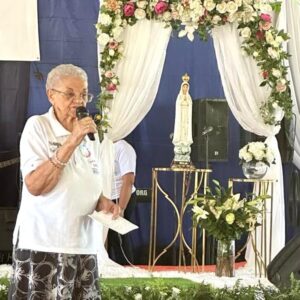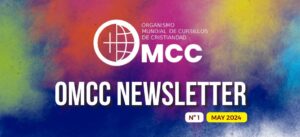The OMCC is a service body to the worldwide MCC. Its fundamental purpose, its principle, is to serve unity, to serve identity, to serve the mission and life of the Movement worldwide.
To specify and develop this service, it is necessary, first, to determine the primary lines that frame it, focus it and drive it forward. It is also required to underline the attitudes and the essential spirit with which we want to approach the task. This does not mean predetermining a closed and rigid programme of action or setting a directive guideline for the OMCC. The OMCC is a service structure, basically a subsidiary one, whose priority must be to promote the life of the Movement, throughout the world, in its different realities. The actions, activities and proposals of the OMCC will always be determined by the reality of the Movement1 and by the needs, concerns and requirements of its main actors, the National and Diocesan Secretariats. Therefore, the service of the OMCC must be based on knowledge and dialogue, reflection and discernment, closeness and availability, and listening and attention to the multiple and diverse voices of the Cursillo Movement worldwide.
Even so, it is certainly necessary to determine some primary lines and starting attitudes. Because there are different frameworks of interpretation and understanding of our Movement and, therefore, different ways of positioning oneself before the service that the MCC requires today. The individual trajectory of each leader, and the global trajectory of each Secretariat, is to a large extent shaped by this framework of interpretation of the MCC, by a particular understanding of the origin and nature of the Movement, of its development over time and of its position in the face of reality. It is, therefore, important to clearly establish the basic principles and conceptual framework on which the candidacy is presented, which should be a coherent reflection and a distinctive sign of the trajectory of its components.
In this way, three primary lines or three fundamental principles for the service to be provided by the OMCC stand out:
The IDENTITY and UNITY of the Movement, taking as a priority frame of reference the OMCC Statute itself, the decree of canonical recognition of the CCM and the book of FUNDAMENTAL IDEAS in its 3rd Edition (IFMCC 3)
- The Cursillo Movement is a broad and diverse reality, adapted to very different cultural environments, with different backgrounds, with different particularities and “traditions”, with different nuances and accents in its way of acting… and this diversity is a richness, also a reflection of the diversity of the Church and of the various human realities. This is what allows the Cursillo Movement’s activity to really respond to the concrete people with their own conditions.
- This diversity is brought together in the necessary unity around a common identity shared by all, an identity derived from the charism, mentality, purpose, strategy and method of the Cursillo Movement. Unity is based on what is really essential to the Movement.
- Unity in diversity is undoubtedly a challenge. That means, first of all, accepting diversity… We are not just a movement of blacks and whites; we are a movement of colours, of many different colours! But by the same token, it means accepting unity, the fact that we are only united. And unity has to be in the truth and in the essential and shared identity of the MCC, discerned and accepted by all.
- Identity has to be made explicit somehow, even if only partially and to a limited extent. So that it can be understood and shared . And the best expression of the identity of the MCC is to be found in the triad of essential documents: the decree of canonical recognition of the MCC, the Statute of the OMCC and the IF3Ed book.
- These documents combine the essential discernment that the Church hierarchy has made of our charism. and the Movement’s own self-understanding of the charism that the Movement, in a World Meeting, has agreed by a majority (World Meeting in Brisbane, Australia, 2013, where the text of Fundamental Ideas 3 Edition was approved). There is, therefore, no other interpretation of our Movement, nor is it necessary to look back. We already have our basic framework, from which the Movement must continue to move forward.
- Certainly, it is necessary to continue reflecting, discerning and clarifying the essentials of the Cursillo Movement. And it is a task to be carried out by all of us, helping each other to better understand our charism, to be faithful to what is really essential and to be free in what is not essential, always maintaining that bond of unity, charity and friendship that shapes us as a Movement.
- Only to the extent that the understanding of our true identity grows, only to the extent that it is better assumed and more integrated into the life of our Movement, in its leaders, in its Schools and Secretariats, will the Movement bear fruit in today’s reality. It is an absolute necessity: to rediscover, recover and revive our identity and to do it together, united, as a single ecclesial Movement.
- The service of the OMCC to the whole Cursillista community of the world has to be developed along these lines: to promote a better understanding and living of the identity of the Cursillo Movement and a greater unity in the essentials of the Cursillo Movement. Following what the Statute itself indicates and projecting itself from what is shown in IFMCC 3.
- The OMCC Statute clearly states the objectives of the OMCC (article 3), which must necessarily form the basis of the work project and action plan:
- Promote unity of understanding of the essentials of MCC at the global level;
- Preserve the CCM in its fidelity to the Church and its Magisterium (cf. IFMCC 3, n. 345);
- Preserve the identity and unity of the MCC in its essence, in fidelity to its charism, to the book of Fundamental Ideas of the MCC and to the conclusions of World Encounters (cf. IFMCC 3, n. 345);
- To facilitate the mutual exchange of information, initiatives and continued reflection of the International Groups;
- Encourage International Groups to fulfil their responsibilities to National Secretariats;
- Promote unity and cooperation between International Groups;
- Assist International Groups in achieving their objectives;
- Promote reflection and study on the role and mission of the Cursillo Movement worldwide;
- Help introduce MCC in countries where it has not yet been established.
- IFMCC 3 also sets out basic guidelines for maintaining one’s own identity (IFMCC 3, no. 109), maturing and growing the Movement (IFMCC 3, no. 72), continuing to respond originally to the challenges of the present time (IFMCC 3, no. 75, 83) and for continuing to create unity in diversity (IFMCC 3, no. 84).
The ECLESIALITY of the Movement, concretised in a particular way by following the orientations, indications and guidelines derived from the current MAGISTERY of the CHURCH, especially the proposals of Pope Francis and the immediate suggestions of the Dicastery for the Laity, the Family and Life.
- The Cursillo Movement is an ecclesial movement, and this is a distinctive and fundamental feature of our identity and for our unity. We are Church before being a movement, Christians before being cursillistas. The way of the Cursillo Movement is, today and always, the way of the Church .
- The words of Pope Francis in this regard are unambiguous: “A clear sign of the authenticity of a charism is its ecclesiality, its ability to integrate itself harmoniously into the life of the holy and faithful People of God for the good of all “.
- To walk in the ecclesiality of the CCM means to be more aware and to live more fully in the saving presence of God in all our activities. It means responding more passionately to our evangelising mission, the kerygma’s urgency, and the call to go out to others. And it means living more in communion, feeling and knowing ourselves to be one, and making all our structures and activities “a house and school of communion” (IFMCC 3, n. 308). Again in the words of Pope Francis: “It is in communion, even if it hurts, that a charism becomes authentically and mysteriously fruitful “.
- Like other ecclesial realities, we are now called to live our Church in a new way: as a Church going out, in missionary, pastoral and structural conversion; as a Church more of God and more at the service of the men and women of today; a Church that is more evangelising and more in communion. Pope Francis’ dream of “a missionary option capable of transforming everything” for the ecclesial renewal that cannot be postponed is also a dream and a challenge for our Movement.
- Ecclesiality today also entails considering SYNODALITY in our MCC since “synodality expresses the nature of the Church, its form, its style, its mission… it is the path that God expects of the Church of the third millennium “. And therefore, it supposes to consider how we have to walk together, together in the Movement and together in the Church, from mutual listening, from dialogue, from closeness and welcome… and from listening to the Holy Spirit.
- Likewise, a genuine and sincere ecclesiality supposes an honest and sincere acceptance of the orientations and indications that Pope Francis has addressed explicitly to the CCM: in the III European Ultreya in Rome (2015) or in the VII National Ultreya in Italy (2022). Some evident and very concrete indications derive from these interventions, which should mark a primary line of reflection and action for the whole Movement:
- “You have been called to make the charism that the Lord has entrusted to you bear fruit“.
- “How necessary it is to go out, to go beyond, without ever tiring, to meet the so-called distant ones.
- “Look for ways to move forward with your charisma. This is very important. Don’t let external conditioning block us”.
- “You will do so, if you are docile, humble and trusting, under the guidance of this holy mother, the Church, who always seeks the good of all her children; if you are in harmony with your pastors and united with them in the mission of bringing the joy of the Gospel to all”.
- “This going beyond allows you to encounter diverse situations and cultures, and the initial charisma must be translated by that culture. But not betrayed! Translated. It must be the charisma, but translated”.
- “I don’t want problems; I follow the initial charisma…”. In this way, you will become a beautiful exhibition, a museum. You will make of your Movement a museum of things that are useless today”.
- “Every charism is called to grow. Why? Because it carries within it the Holy Spirit and the Holy Spirit makes it grow. Each charism must confront diverse cultures, diverse ways of thinking, diverse values. And what does it do? It allows itself to be led by the Holy Spirit”.
- “I would like to point out two fundamental directions for your “going beyond”. The first is going towards communion. It means going beyond oneself and one’s own group to form a community and to grow in the Church”.
- “Unity is not based on the charism of a single individual or on the spiritual “line” of a “current”. No, unity is founded on the spiritual heritage accepted by all, lived and shared by all, understood by all and entrusted to all”.
- “Your movement also faces the challenge of forming communities of missionary disciples who go out to meet those who are far away, overcoming the criterion of “it has always been done this way”, which is not a Christian criterion.
- An essential dimension of the ecclesiality of our Movement is its articulation, connection and harmony with the Dicastery for the Laity, Family and Life. The Dicastery brings the voice of the Church, its orientation and discernment, closer and more directly to us. And therefore, it is up to us to accept its indications “with humility and trust“, as Pope Francis told us. Both in its communications and in the meeting that the OMCC and the International Groups held in Rome in 2022 with its top leaders, the Dicastery has clearly shown where and how the Cursillo Movement should walk10 … and that is the path of the ecclesiality of the Cursillo Movement.
The REALITY of TODAY, the world and society of our time, to which the Movement must necessarily respond, in which it must carry out its urgent evangelising mission.
- In the words of Pope Francis, “We are not simply living in an era of change, but a change of era“. A change of epoch that requires rethinking how to live, how to share and how to adequately transmit the Christian proposal. This concerns the whole Church, and this affects the MCC.
- Today’s reality is complex, variable, uncertain, and ambiguous. It is different. It poses new challenges because there are many new human, family, social and cultural situations, different . And it is to these situations and challenges that the Cursillo Movement must necessarily respond if it wants to carry out its evangelising task.
- To this end, a serious and serene exercise of reflection, study and discernment of the current reality must be carried out in all the structures of the Cursillo Movement. “For this reason, the charism to which we belong must be deepened more and more, and we must always reflect together to incarnate it in the new situations we live in. This requires of us a great docility, a great humility, to recognise our limits and to accept to change outdated ways of doing and thinking, or methods of apostolate that are no longer effective, or forms of organisation of internal life that have proved inadequate or even harmful.”
- This looking at reality, on the other hand, is something very proper and very significant in the charism and mentality of the MCC: “The starting point of the MCC was the profound knowledge of reality – a world with its back to God, to Christ and to his Church” (IFMCC 3, n. 67); “the starting point of the mentality today is still the knowledge of the present reality and the need to respond to it” (IFMCC 3, n. 73).
- Therefore, to study and discern reality to respond appropriately. And this response of the Cursillo Movement, which today is more unavoidable than ever, entails a demand for renewal , for adaptation , for updating . With fidelity, indeed, but also through research, openness and creativity.
- Therefore, a discernment process is required to renew and adapt our SERVICE STRUCTURES, our Schools and our Secretariats. So they are really structures that serve, that fulfil their purpose: to really promote the life of the Cursillo Movement, today, in the current reality, at this time.
- Structures that deepen the specific mindset of the MCC, so that it is indeed the mindset of all MCC leaders.
- Structures that serve the purpose of the Cursillo Movement that are therefore directed outwards and avoid the temptation to close in on themselves. They should encourage people to go out, reach out to others, and proclaim the good news of God’s love to many.
- Structures that promote, nurture and build communion. At all levels of the MCC, inwardly and outwardly. They should be the first spaces to learn and live communion, based on welcoming everyone, mutual respect, free participation, co-responsibility and friendship.
- Structures that work for the full ecclesiality of the MCC, in all areas, from appropriate diocesan insertion to involvement in the synodal journey of the Universal Church.
- A particularly important challenge for our structures today is their capacity to reach out to, welcome and integrate young people into our Movement. It implies a process of reflection, sometimes a profound renewal and a decisive and priority choice to make young people a fundamental reality in the MCC, at all levels.
- In the same perspective, responding to today’s world requires a revision, an updating, and an adaptation of the Cursillo Movement’s METHOD. Precisely so that it may better fulfil its function, so that it may make possible a fruitful, adequate, effective evangelising activity in the present context, attending to the men and women of today in their concrete and specific circumstances.
- The first prerequisite for this is to understand and take on board what is really essential to the method. That which allows the method to be effective today as in the past. That which constitutes its strength and its certainty.
- On these essential elements and aspects of the method it will be necessary to discern how best to implement them, and how to apply them in a way that best suits today’s conditions and situations.
- The Precursillo, revising it so that it can be an actual process of accompanying people, knowing how to welcome them in their diverse circumstances and conditions, however difficult they may seem . May the necessary steps be taken, through friendship, witness and prayer, to reach out to many brothers and sisters who are far away, disoriented and hurting. Including young people!
- The Cursillo, adapting it so that it is always a moment of encounter. With oneself, with God and with others. Accepting that the encounter can have different nuances for different people. And that people can have different ways of integrating into the Church … The starting point, in the Cursillo, will always have to be the experience of the love of God, the begining of the conversion process and the possibility of a new life…
- The Postcursillo, renewing it so that it can always be a channel of life , so that people can find community and ecclesial spaces with life, open and dynamic, that encourage them to continue walking and to continue fermenting new environments, always in Movement, always trying to go further.






